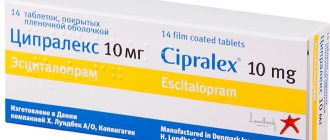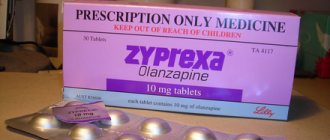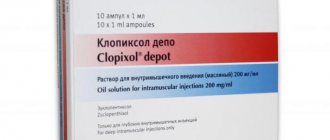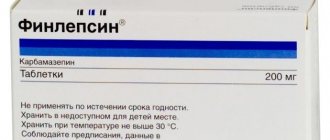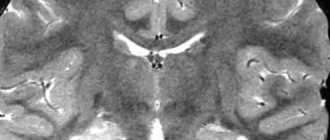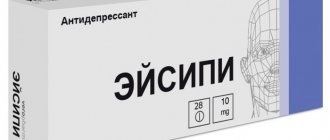Pharmacodynamics and pharmacokinetics
Pharmacodynamics
Antagonist of dopamine D2 receptors and serotonin 5-HT2 . The antipsychotic effect is associated with blockade of D2-dopamine receptors . Compared to classical antipsychotics, it suppresses motor activity less and provokes catalepsy .
Eliminates negative and productive symptoms of schizophrenia , while causing almost no extrapyramidal adverse reactions. It affects sleep: it reduces the period before falling asleep, the number of awakenings, and increases the duration and quality of sleep. Causes an increase in prolactin in the blood. Has a moderate antiemetic effect.
Pharmacokinetics
When taking one dose, the concentration of the active substance in the blood increases and reaches a maximum after 24 hours. Equilibrium concentrations are achieved after 4–5 days of regular use. Paliperidone is an active metabolite of risperidone . Its release characteristics provide less fluctuation in paliperidone .
It is quickly distributed in tissues, 74% binds to blood proteins. A week after taking one tablet, 59% is excreted in the urine. It is not metabolized in the liver and is therefore excreted unchanged. In vitro studies have shown that cytochrome P450 isoenzymes play a certain role in metabolism, but not a significant one. The half-life is 23 hours.
Since the active substance is not metabolized in the liver, there is no need to reduce the dose in patients with moderate liver dysfunction. However, the dose should be reduced in severe renal impairment. The pharmacokinetics of paliperidone in adolescents is comparable to that in adults.
Drug interactions and similar products
Since paliperidone is practically not metabolized in the liver, it does not take part in pharmacokinetic interactions with drugs that are metabolized by isoenzymes of the cytochrome P 450 system. The drug can reduce the therapeutic effect of levodopa and other dopamine agonists.
There are many drugs that have antipsychotic properties. The most popular analogues of Inveg:
- Haloperidol. This is a neuroleptic drug based on the substance haloperidone. It is prescribed as a sedative for psychomotor agitation due to psychosis in the manic stage, dementia, schizophrenia and alcoholism.
It is also used to treat psychoses with hallucinations, paranoid and delusional states, aggression, and behavioral disorders. It has many contraindications and side effects, so it is taken under medical supervision.
Azaleptin. This is a medicine that contains clozapine. Has antipsychotic, sedative properties. It is prescribed for schizophrenia, manic and manic-depressive states, psychomotor agitation.
As a rule, it is taken in case of resistance to therapy with other antipsychotics. Contraindicated in patients with intolerance to components, suppression of hematopoiesis, alcoholic and toxic psychoses, epilepsy, disorders of the cardiac and respiratory systems.
- Sulpiride pilyule_nervi-369. This drug belongs to the classical antipsychotics from the group of substituted benzamides. It also has antidepressant properties. Has an antiemetic effect. The drug is prescribed for the short-term treatment of symptoms of anxiety when other remedies have not given the desired result.
It can also be used to treat anxiety and self-harm in children over 6 years of age, especially if they have autism syndrome. It has serious contraindications that should be taken into account before prescribing it.
Only the attending physician can prescribe a particular antipsychotic. Self-medication can lead to negative reactions and complications.
Side effects
Common adverse reactions:
Uncommon adverse reactions:
- cystitis;
- ear infections, bronchitis , sinusitis , tonsillitis ;
- anaphylactic reaction;
- anemia , neutropenia , leukopenia ;
- hyperprolactinemia;
- anorexia , hypoglycemia and hyperglycemia ;
- diabetes;
- sleep disturbances, “nightmare” dreams;
- convulsions , impaired attention, paresthesia , psychomotor hyperactivity;
- conjunctivitis , dry eyes, lacrimation;
- pain and ringing in the ears;
- bradycardia , AV block QT interval , increased or decreased blood pressure ;
- flatulence , fecal incontinence, gastroenteritis ;
- arthralgia , joint swelling and stiffness;
- dysuria , urinary incontinence;
- decreased libido , nipple discharge, gynecomastia ,
- sexual dysfunction, changes in the menstrual cycle;
- peripheral edema , thirst, fever , hypothermia .
Invega, instructions for use (Method and dosage)
The drug is taken orally in the morning, regardless of meals. The dosage of Inveg depends on the severity of the disease and the age of the patients.
For schizophrenia, adults are prescribed Invega 6 mg once a day. If an increase in dose is required, it is recommended to increase it by 3 mg every 5 days. In some patients, the effect occurs at lower or higher doses - in the range of 3-12 mg per day. Adolescents are recommended 3 mg per day. However, higher doses may be required, increasing them every 5 days.
For schizoaffective disorders, the recommended dose is 6 mg per day, in the morning. It is also possible to increase the dose to 12 mg per day, which is carried out gradually.
For moderate liver dysfunction, there is no need to reduce the dose. For severe cases, the dose is no more than 3 mg per day. In elderly patients, the dose depends on renal function. The safety of the drug in the treatment of schizophrenia in children under 12 years of age has not been studied. When transferring patients from paliperidone to other antipsychotics, you need to monitor the patient's condition.
Indications and restrictions for taking Invega
The drug is a potent drug, so it should be taken only if there are special indications. Among them:
- Treatment of schizophrenia. The medicine is prescribed in the acute stage for both children and adults.
- Prevention of schizophrenic exacerbations.
- Treatment of schizoaffective disorders. In this case, the drug is used as the main medicine or as part of complex therapy together with mood stabilizers and antidepressants.
Dosage regimen
The only significant contraindication is individual intolerance to the active and auxiliary components of the drug. The drug is not prescribed to children under 12 years of age due to the lack of data on its safety and effectiveness.
There are a number of restrictions under which its use is permitted, but with extreme caution:
- tendency to seizures;
- narrowing of the lumen of the digestive tract (high risk of obstruction);
- dysphagia (impaired swallowing ability);
- old age (especially in combination with dementia);
- parkinsonism (tendency to develop side effects, including neuroleptic malignant syndrome).
During pregnancy, it is possible to use the medicine, but only in cases of extreme necessity, when the benefit to the mother is higher than the potential risk to the fetus. It is better for nursing mothers not to take it, since paliperidone can pass into breast milk and have a negative effect on the baby (sedation, hypotension and other disorders).
Overdose
Symptoms of overdose: drowsiness and excessive sedation, arterial hypotension , tachycardia , extrapyramidal disorders and ventricular fibrillation . The situation is aggravated because this is a drug with a prolonged release of the active substance. Treatment is symptomatic with maintenance of adequate oxygenation cardiovascular function . Severe extrapyramidal symptoms are relieved with m-anticholinergic drugs . specific antidote .
Side effects and symptoms of overdose
The drug is a potent drug, so its use may lead to the development of negative reactions. Among them:
- dizziness and headache;
- extrapyramidal anomalies;
- dystonia;
- general weakness, lethargy;
- sedation;
- dyskinesia;
- trembling of limbs;
Parkinsonism
development of parkinsonism;
- visual impairment;
- cardiac disorders (tachycardia, arrhythmia, heart block);
- orthostatic hypotension;
- attacks of vomiting, decreased salivation, abdominal pain, intestinal obstruction;
- pancreatitis, jaundice;
- asthenic syndrome;
- weight gain;
- infections of the nose and throat (nasopharyngitis);
- mental disorders (fear, anxiety, excessive excitability);
- nosebleeds;
- decreased sexual activity, desire, amenorrhea in women and impotence in men;
- urinary incontinence or retention;
- allergic reactions on the skin (redness, itching, burning, urticaria, erythema);
- nasal congestion, cough, shortness of breath;
- pain in muscles and bones, back, muscle spasms;
- angioedema.
When taking high doses, increased side effects are observed. Main symptoms of overdose:
- drowsiness;
- sedation;
- increased heart rate;
- decrease in blood pressure.
Advantages of Invega
Treatment is carried out in a hospital setting. First, the patient's stomach is washed and laxatives and sorbents are given. There is no specific antidote for paliperidone. Therefore, symptomatic therapy is prescribed. At the same time, it is important to control the vital functions of the body.
Interaction
Use caution when prescribing with drugs that prolong the QT interval . Paliperidone does not cause clinically significant interactions with drugs that are metabolized by the cytochrome P450 system . In vitro studies have shown that paliperidone does not cause inhibition or induction of isoenzymes of this cytochrome .
The drug should be used with caution in combination with other centrally acting drugs. Do not co-administer with drugs that cause orthostatic hypotension . Neutralizes the effect of levodopa . An interaction between this drug and lithium is unlikely.
Simultaneous administration with sodium valproate - the concentration of both drugs did not change. significant interaction with paroxetine . Use with risperidone has not been studied, but with carbamazepine it caused a decrease in the concentration of paliperidone in the blood by 37%, and therefore the dose of the latter needs to be adjusted. Use with trimethoprim did not affect the pharmacokinetic characteristics of paliperidone .
Pharmacological profile
The paliperidone molecule has one additional hydroxyl group compared to risperidone.
Because of this, the liver is not capable of metabolizing the drug, most of the medication is excreted by the kidneys. Thanks to this effect, Invega practically does not interact with drugs metabolized in the liver. The drug is safe to prescribe to patients who have mild or moderate liver dysfunction.
An additional positive point is that Invega provides a faster therapeutic effect, and there is no need for a gradual increase in dosage.
In the production of medicines, the principle of osmotic release of the active substance is used. Osmotic pressure promotes the release of the drug at a certain rate.
The capsule has a core consisting of three levels. It is surrounded by a semi-permeable membrane and shell. The two layers of the core contain the main component of the drug and additional substances.
In the third, pushing layer, osmotic structures are located. There are 2 holes on the layers containing the medicine. Through them, the active substance is gradually released throughout the day.
The drug shell dissolves in the stomach and intestines. The membrane is saturated with water, which then penetrates into the core. Its hydrophilic polymers swell and form a gel that contains the drug. The gel is subsequently squeezed out through these holes.
The insoluble components of the capsule are excreted in the feces. Therefore, a tablet can be seen in the stool. This is fine.
A stable level of the drug in the blood is formed approximately 5 days from the start of treatment and from this moment on there is a stable therapeutic effect.
The main active ingredient of the drug is paliperidone. Invega tablets have a prolonged antipsychic effect. They have a positive effect on sleep, reduce the time before falling asleep, reduce the frequency of awakenings and increase the total amount of sleep time. They have calming properties for the nervous system.
Reviews about Invega
This drug eliminates productive symptoms (delusions, hallucinations , agitation ) in schizophrenia . According to the observation of psychiatrists, the drug is more effective in schizophrenia , accompanied by apatoabulic syndrome (indifference, indifference, detachment from everything, pathological lack of will, reluctance to perform any actions). Taking the drug gives a resocializing effect - apathy towards everything that happens disappears and the potential for action appears. In their reviews, patients note the effectiveness of the drug and the presence of side effects.
- “... I took 12 mg for two months. The negative symptoms went away - he became sociable and became interested in life. Prolactin increased greatly and I was switched to Rispolept.”
- “... The general condition on Inveg is much better than on others. A desire for creativity, which disappeared 14 years ago, and creative vigor appeared.”
- “... I take 12 mg - the condition has returned to normal, but in order to consolidate the effect, they told me to drink at this dosage for another 1.5 months and a half, and then reduce it to 9 mg.”
- “... The most unpleasant side effect for me is hormonal disorders. I’m gaining a lot of weight, my periods have completely disappeared, there’s discharge from the mammary glands and my breasts are growing.”
- “... I take the medicine Invega, I tolerate it well. The doctor said that the tablet should not be divided, since its shell ensures a gradual release and long-term effect of the active substance.”
- “... As the dose increases, flu-like symptoms appear: aching joints, muscle pain, nasal congestion, thirst, rapid breathing - a condition similar to a temperature over 40.”
This drug is safer than risperidone , but is approved for use only in adults and adolescents.
General information about the drug
Invega is a popular drug used to treat psychosis. It is produced by a pharmaceutical company (USA).
Drug group, INN, application
The drug belongs to a special drug group - antipsychotic drugs. They are also called antipsychotics. Such drugs affect the central nervous system.
The international nonproprietary name of a drug depends on the active substance that is included in its composition and determines its effect on the body. The INN of the drug Invega is Paliperidone. The scope of application of the drug is psychiatry. It is prescribed for the treatment of various psychotic disorders in adults and adolescents from 12 years of age.
Release form and cost
The drug is available in the form of extended-release tablets. They have a capsule-like shape. Their color and markings differ depending on the content of the active substance:
- 3 mg – white tablets marked PAL 3;
- 6 mg – yellowish color and the inscription PAL 6;
- 9 mg – pinkish and gray tint labeled PAL 9;
- 12 mg – yellow-brown color with the inscription PAL 12.
Advantages of the Invega drug molecule
All tablets are packaged in cell blisters of 7 pieces. A cardboard box contains 28 or 56 tablets. Invega is available with a prescription; its price depends on the content of the active ingredient in 1 tablet and their quantity in the package. Also, the cost may vary depending on where it was purchased. Examples of prices for medicine in different pharmacies in Russian cities:
| Dosage | Name of pharmacy and city | Cost in rubles |
| 9 mg (28 tablets) | Baltika-Med, St. Petersburg | 10 790 |
| 3 mg (28 pieces) | Dialog, Moscow and region | 6736 |
| 3 mg No. 28 | Dialog, Moscow and region | 6874 |
| 3 mg (28 pieces) | GORZDRAV, Moscow | 7082 |
| 9 mg No. 28 | GORZDRAV, Moscow | 9490 |
| 9 mg (28 tablets) | Violet, St. Petersburg | 9998 |
| 6 mg (28 pieces) | Vitamin, St. Petersburg | about 7590 |
This remedy is one of the vitally important drugs. It can only be purchased with a special prescription from the attending psychiatrist.
Invega price, where to buy
You can buy Invega at any pharmacy. The cost of 28 tablets is 7068-8080 rubles.
- Online pharmacies in RussiaRussia
- Online pharmacies in UkraineUkraine
ZdravZone
- Invega 6mg No. 28 extended-release film-coated tablets Jansen-Cilag
- Invega 3 mg No. 28 extended-release film-coated tablets Jansen-Cilag
- Invega 9mg No. 28 extended-release film-coated tablets Jansen-Cilag
show more


